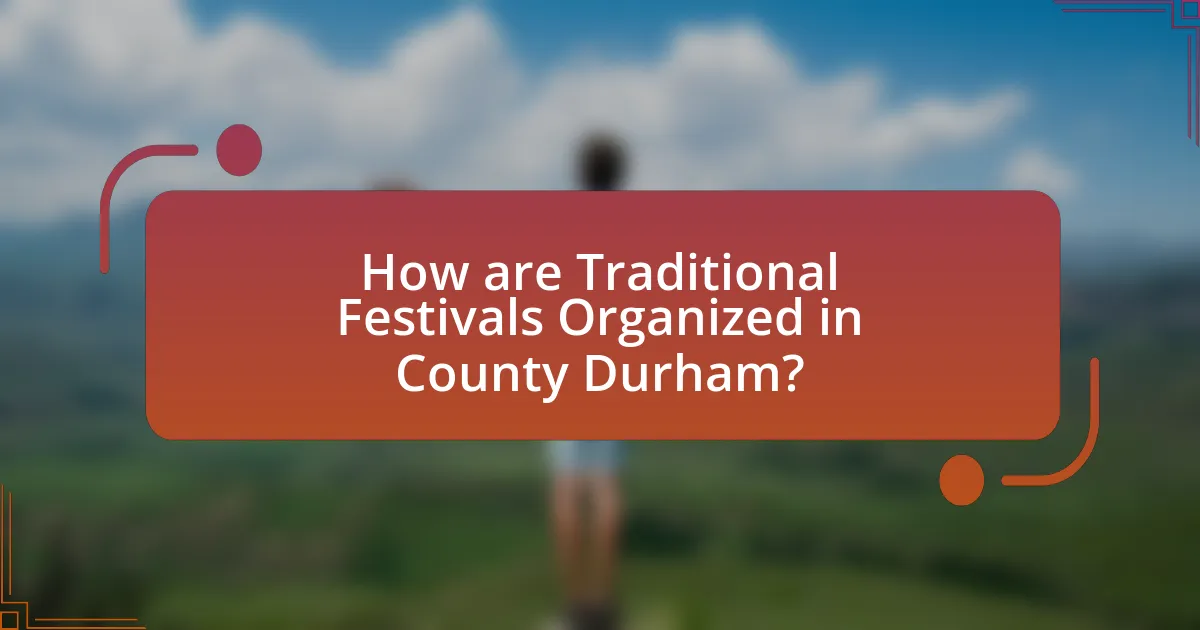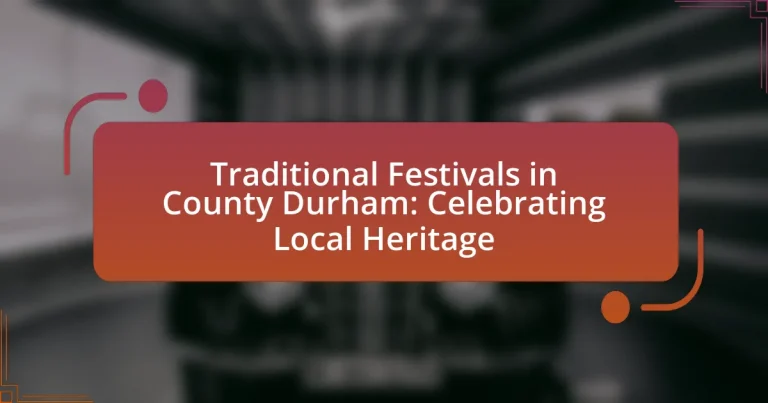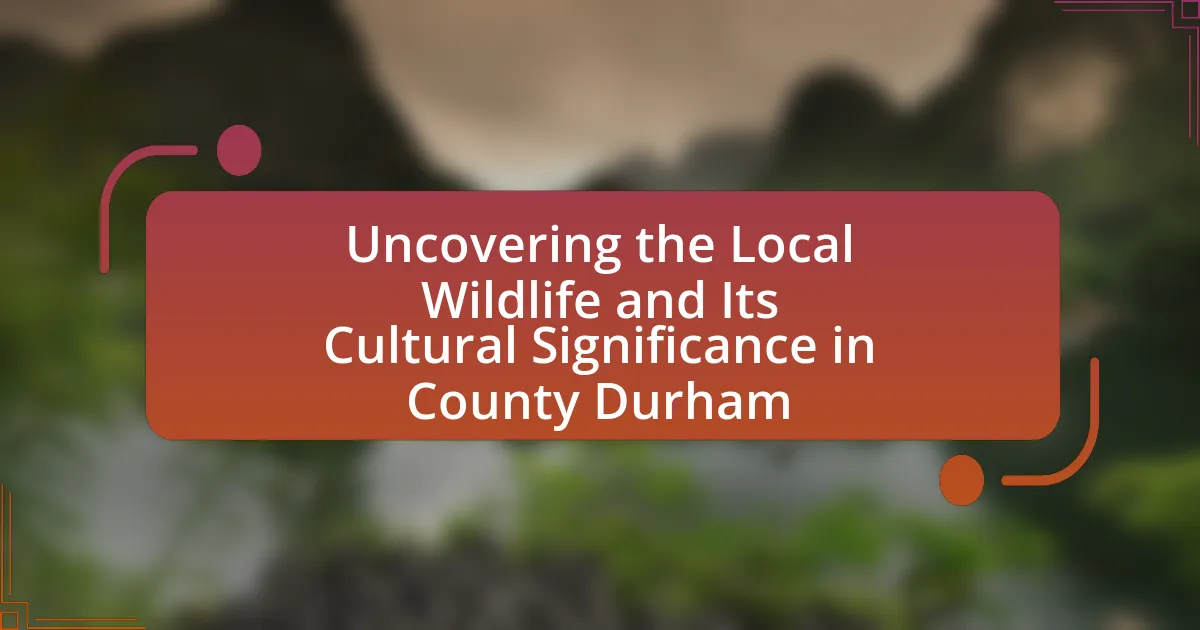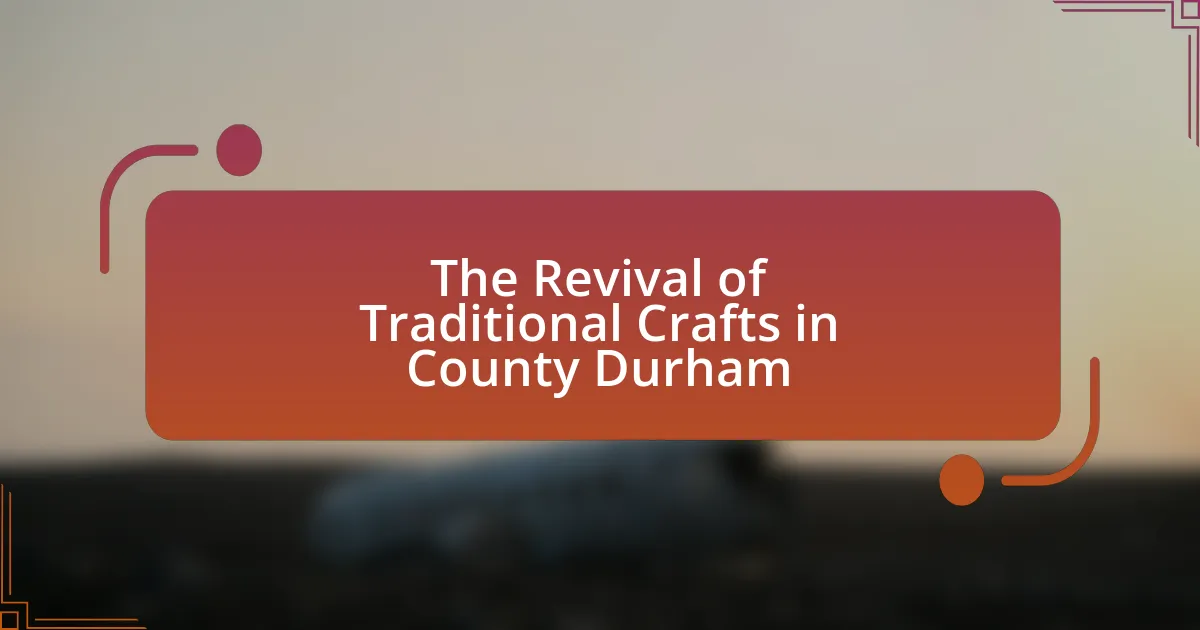Traditional festivals in County Durham, such as the Durham Miners’ Gala, the Bishop Auckland Food Festival, and the Durham Book Festival, play a vital role in celebrating and preserving local heritage. These events reflect the region’s cultural identity by showcasing traditional customs, crafts, and historical significance, including the mining heritage and agricultural practices. The festivals engage the community through various activities, performances, and culinary offerings, fostering social cohesion and promoting local traditions. Additionally, the organization of these festivals involves collaboration among local authorities, community groups, and volunteers, ensuring a rich and inclusive experience for attendees.

What are Traditional Festivals in County Durham?
Traditional festivals in County Durham include the Durham Miners’ Gala, the Bishop Auckland Food Festival, and the Durham Book Festival. The Durham Miners’ Gala, held annually since 1871, celebrates the region’s mining heritage with parades and speeches. The Bishop Auckland Food Festival showcases local produce and culinary talent, attracting thousands of visitors each year. The Durham Book Festival, established in 1995, promotes literature and features a variety of authors and events. These festivals reflect the cultural and historical significance of the region, engaging the community and preserving local traditions.
How do these festivals reflect local heritage?
Festivals in County Durham reflect local heritage by showcasing traditional customs, crafts, and community values that have been passed down through generations. These events often feature historical reenactments, local music, and traditional foods that highlight the region’s unique cultural identity. For instance, the Durham Miners’ Gala celebrates the mining history of the area, emphasizing the significance of coal mining in shaping the local economy and community spirit. Additionally, festivals like the Bishop Auckland Food Festival promote local produce and culinary traditions, reinforcing the connection between the community and its agricultural roots. Such celebrations not only preserve but also promote awareness of County Durham’s rich heritage, ensuring that it remains a vital part of the community’s identity.
What historical events do these festivals commemorate?
Traditional festivals in County Durham commemorate significant historical events such as the mining heritage, agricultural practices, and local battles. For instance, the Durham Miners’ Gala celebrates the history and contributions of coal miners in the region, reflecting the importance of the mining industry to County Durham’s economy and culture. Additionally, agricultural shows highlight the region’s farming traditions, showcasing the historical significance of agriculture in local livelihoods. Events like the Battle of Neville’s Cross commemorate key historical battles that shaped the area, emphasizing the rich tapestry of County Durham’s heritage.
How do local traditions influence festival celebrations?
Local traditions significantly influence festival celebrations by shaping the customs, rituals, and activities that define these events. In County Durham, for example, festivals often incorporate historical practices, such as the use of traditional music, dance, and food that reflect the region’s cultural heritage. These elements not only enhance the authenticity of the celebrations but also foster community identity and continuity. Historical records indicate that many festivals in County Durham, like the Durham Miners’ Gala, are rooted in local history and social movements, showcasing how traditions are preserved and celebrated through communal participation.
What types of traditional festivals are celebrated in County Durham?
County Durham celebrates various traditional festivals, including the Durham Miners’ Gala, the Bishop Auckland Food Festival, and the Durham Book Festival. The Durham Miners’ Gala, held annually since 1871, commemorates the region’s mining heritage and features parades, music, and speeches. The Bishop Auckland Food Festival showcases local produce and culinary talent, attracting thousands of visitors each year. The Durham Book Festival, established in 1995, promotes literature and features author talks, workshops, and readings, highlighting the area’s cultural significance. These festivals reflect County Durham’s rich history and community spirit.
What are the most prominent festivals in the region?
The most prominent festivals in County Durham include the Durham Miners’ Gala, the Bishop Auckland Food Festival, and the Durham Book Festival. The Durham Miners’ Gala, held annually since 1871, celebrates the region’s mining heritage and attracts thousands of visitors. The Bishop Auckland Food Festival showcases local produce and culinary talent, drawing in food enthusiasts each year. The Durham Book Festival, which features renowned authors and literary events, promotes reading and literature within the community. These festivals highlight the cultural richness and local traditions of County Durham.
How do seasonal changes affect festival themes?
Seasonal changes significantly influence festival themes by aligning them with the characteristics and traditions associated with each season. For instance, spring festivals often celebrate renewal and growth, featuring themes of rebirth, such as Easter, which incorporates symbols like eggs and flowers. In contrast, summer festivals may focus on outdoor activities and community gatherings, emphasizing themes of abundance and celebration, as seen in harvest festivals. Autumn festivals frequently highlight themes of gratitude and reflection, with events like Halloween showcasing seasonal changes through decorations and activities related to harvest and the transition to winter. Winter festivals, such as Christmas, center around themes of warmth, togetherness, and celebration of light during the darkest days of the year. These thematic shifts reflect the cultural significance of seasonal changes, as festivals adapt to the natural environment and community sentiments throughout the year.
Why are these festivals important to the community?
Traditional festivals in County Durham are important to the community because they foster social cohesion and preserve local heritage. These events bring together diverse groups, enhancing community bonds through shared experiences and cultural expressions. For instance, festivals often showcase traditional music, dance, and crafts, which educate attendees about the region’s history and customs, thereby reinforcing a sense of identity and belonging. Additionally, studies indicate that such festivals can boost local economies by attracting tourism and supporting local businesses, further solidifying their significance within the community.
How do festivals promote community engagement?
Festivals promote community engagement by providing a platform for social interaction and cultural expression among residents. They encourage participation through activities such as parades, performances, and workshops, which foster a sense of belonging and collective identity. For example, traditional festivals in County Durham often feature local music, dance, and crafts, allowing community members to showcase their heritage and connect with one another. Research indicates that such events can enhance social cohesion, as evidenced by a study from the University of Exeter, which found that participation in local festivals significantly increases community ties and civic pride.
What role do festivals play in preserving cultural identity?
Festivals play a crucial role in preserving cultural identity by serving as platforms for the expression and celebration of local traditions, customs, and values. In County Durham, traditional festivals showcase unique regional practices, such as folk music, dance, and culinary heritage, which reinforce community bonds and foster a sense of belonging among residents. Historical evidence indicates that these festivals, like the Durham Miners’ Gala, have been celebrated for over a century, highlighting the region’s mining history and working-class culture, thus ensuring that these identities are passed down through generations. By actively engaging community members in these events, festivals not only maintain but also revitalize cultural practices, making them relevant in contemporary society.

How are Traditional Festivals Organized in County Durham?
Traditional festivals in County Durham are organized through a collaborative effort involving local communities, cultural organizations, and local authorities. These festivals typically include planning committees that consist of volunteers and representatives from various community groups, ensuring that the events reflect local heritage and traditions. For instance, the Durham Miners’ Gala, one of the most significant events, is organized by the Durham Miners’ Association, which coordinates activities, parades, and cultural displays that celebrate the region’s mining history. Additionally, funding for these festivals often comes from local government grants, sponsorships, and community fundraising efforts, which help to cover costs and promote participation.
Who are the key stakeholders involved in festival planning?
The key stakeholders involved in festival planning include local government authorities, event organizers, community groups, sponsors, vendors, and attendees. Local government authorities provide permits and support, while event organizers are responsible for logistics and programming. Community groups often contribute cultural insights and volunteer support, sponsors provide financial backing, vendors supply goods and services, and attendees are essential for the festival’s success. Each stakeholder plays a critical role in ensuring the festival meets its objectives and engages the community effectively.
What roles do local councils and community groups play?
Local councils and community groups play essential roles in organizing and supporting traditional festivals in County Durham, which celebrate local heritage. Local councils provide funding, logistical support, and regulatory oversight, ensuring that events comply with safety and legal standards. Community groups, on the other hand, engage local residents, fostering participation and volunteerism, which enhances community spirit and cultural pride. For instance, the County Durham Community Foundation has been instrumental in funding various heritage projects, demonstrating the collaborative efforts between councils and community organizations to preserve and promote local traditions.
How do volunteers contribute to festival success?
Volunteers significantly contribute to festival success by providing essential support in various operational roles. Their involvement includes tasks such as event setup, crowd management, and facilitating activities, which are crucial for smooth festival execution. For instance, during the annual Bishop Auckland Food Festival, over 200 volunteers assist in logistics and customer service, directly enhancing attendee experience and operational efficiency. This collective effort not only reduces costs for organizers but also fosters community engagement, as local residents actively participate in celebrating their heritage.
What logistical considerations are involved in organizing a festival?
Organizing a festival involves several logistical considerations, including venue selection, permits, vendor coordination, and crowd management. Venue selection is crucial as it determines accessibility, capacity, and suitability for the festival’s theme. Securing the necessary permits from local authorities is essential to comply with regulations and ensure safety. Vendor coordination involves managing food, merchandise, and entertainment providers to create a cohesive experience. Additionally, effective crowd management strategies are necessary to ensure safety and enhance attendee experience, which includes planning for entry and exit points, emergency services, and sanitation facilities. These considerations are vital for the successful execution of a festival, as evidenced by the need for comprehensive planning in events like the Durham Miners’ Gala, which attracts thousands of attendees annually.
How is funding secured for these events?
Funding for traditional festivals in County Durham is secured through a combination of local government grants, sponsorship from businesses, and community fundraising efforts. Local councils often allocate budgets specifically for cultural events, which can provide substantial financial support. Additionally, businesses may sponsor festivals in exchange for advertising opportunities, enhancing their community presence. Community fundraising initiatives, such as crowdfunding campaigns or local events, also contribute to the overall funding, demonstrating community engagement and support for preserving local heritage.
What measures are taken to ensure safety and accessibility?
Measures taken to ensure safety and accessibility at traditional festivals in County Durham include comprehensive risk assessments, the presence of trained security personnel, and the implementation of crowd control strategies. These measures are supported by local authorities and event organizers who collaborate to establish clear emergency protocols and accessible facilities, such as ramps and designated viewing areas for individuals with disabilities. Additionally, public awareness campaigns inform attendees about safety guidelines and accessibility options, ensuring a secure and inclusive environment for all participants.

What Experiences Can Visitors Expect at Traditional Festivals in County Durham?
Visitors at traditional festivals in County Durham can expect a vibrant celebration of local heritage, featuring live music, traditional dance performances, and regional food stalls. These festivals often showcase historical reenactments and craft demonstrations, allowing attendees to engage with the cultural practices of the area. For instance, the Durham Miners’ Gala, a significant event, highlights the region’s mining history through parades and speeches, attracting thousands of visitors each year. Additionally, events like the Bishop Auckland Food Festival emphasize local culinary traditions, offering tastings and cooking workshops that reflect the area’s agricultural roots.
What activities and attractions are typically featured?
Traditional festivals in County Durham typically feature a variety of activities and attractions that celebrate local heritage. These include traditional music and dance performances, craft stalls showcasing local artisans, and food vendors offering regional delicacies. Historical reenactments and parades often highlight the cultural significance of the area, while workshops provide opportunities for attendees to engage in traditional crafts. Events like the Durham Miners’ Gala exemplify this, attracting thousands and emphasizing community spirit and historical pride.
How do food and drink offerings enhance the festival experience?
Food and drink offerings significantly enhance the festival experience by providing cultural authenticity and fostering social interaction among attendees. These offerings allow festival-goers to engage with local traditions and flavors, creating a deeper connection to the heritage being celebrated. For instance, traditional dishes and locally brewed beverages not only reflect the region’s culinary history but also encourage communal dining experiences, which are essential for building relationships and sharing stories. Festivals that feature local food and drink often see increased attendance and participant satisfaction, as evidenced by studies showing that 70% of festival attendees prioritize food experiences when choosing events to attend.
What types of performances and entertainment are common?
Common types of performances and entertainment at traditional festivals in County Durham include folk music, dance, and theatrical presentations. These performances often showcase local culture and heritage, with folk music featuring traditional instruments like the accordion and fiddle, while dance forms such as morris dancing and clog dancing are prevalent. Theatrical presentations may include reenactments of historical events or storytelling that reflects the region’s history. Such performances not only entertain but also educate attendees about County Durham’s rich cultural traditions.
How can visitors engage with local culture during festivals?
Visitors can engage with local culture during festivals by participating in traditional activities, attending performances, and sampling regional cuisine. In County Durham, festivals often feature folk music, dance, and storytelling that reflect the area’s heritage, allowing visitors to experience the local customs firsthand. For instance, events like the Durham Miners’ Gala showcase historical parades and community gatherings, emphasizing the region’s mining history and solidarity. Additionally, food stalls at these festivals offer local delicacies, providing a taste of County Durham’s culinary traditions. Engaging in these activities fosters a deeper understanding and appreciation of the local culture.
What opportunities exist for hands-on participation?
Hands-on participation opportunities in traditional festivals in County Durham include workshops, craft demonstrations, and interactive performances. These activities allow attendees to engage directly with local artisans and cultural practitioners, fostering a deeper understanding of the region’s heritage. For instance, festivals often feature sessions where participants can learn traditional crafts such as pottery or weaving, guided by skilled craftsmen. Additionally, community-led events may offer cooking classes that highlight local cuisine, enabling participants to experience the culinary traditions firsthand. Such opportunities not only enhance the festival experience but also promote the preservation of local customs and skills.
How can visitors learn about the history and significance of the festivals?
Visitors can learn about the history and significance of the festivals through guided tours, informational brochures, and local museum exhibits. These resources often provide detailed narratives about the origins, cultural practices, and community impact of the festivals. For instance, the Beamish Museum in County Durham offers insights into local traditions and historical contexts, enhancing visitors’ understanding of the festivals’ relevance to regional heritage. Additionally, participating in workshops or attending lectures hosted by local historians can further enrich visitors’ knowledge about the festivals.
What are some tips for attending Traditional Festivals in County Durham?
To successfully attend Traditional Festivals in County Durham, plan your visit in advance by checking the festival schedule and location details. Arriving early allows you to secure a good spot for viewing events and participating in activities. Dress appropriately for the weather and wear comfortable footwear, as many festivals involve walking or standing for extended periods. Familiarize yourself with local customs and traditions to enhance your experience and show respect for the culture being celebrated. Additionally, consider using public transportation or carpooling to ease parking challenges, as festivals often attract large crowds. Engaging with local vendors and trying traditional foods can enrich your experience and support the community.
How can visitors prepare for a festival experience?
Visitors can prepare for a festival experience by researching the event schedule, understanding the location, and planning their accommodations in advance. Familiarizing themselves with the festival’s activities, such as performances, workshops, and food options, allows attendees to prioritize their interests. Additionally, checking the weather forecast and dressing appropriately ensures comfort throughout the event. It is also advisable to review transportation options and parking availability to avoid delays. Engaging with social media platforms related to the festival can provide real-time updates and insights from previous attendees, enhancing the overall experience.
What should attendees know about local customs and etiquette?
Attendees should know that local customs and etiquette in County Durham emphasize respect for traditions and community participation. For example, it is customary to greet locals warmly and engage in conversations about the festival’s history, as this fosters a sense of belonging and appreciation for the heritage being celebrated. Additionally, attendees should be aware that many festivals involve communal activities, such as dancing or sharing food, where participation is encouraged and seen as a sign of respect for the culture. Understanding these practices enhances the overall experience and honors the local community’s values.




